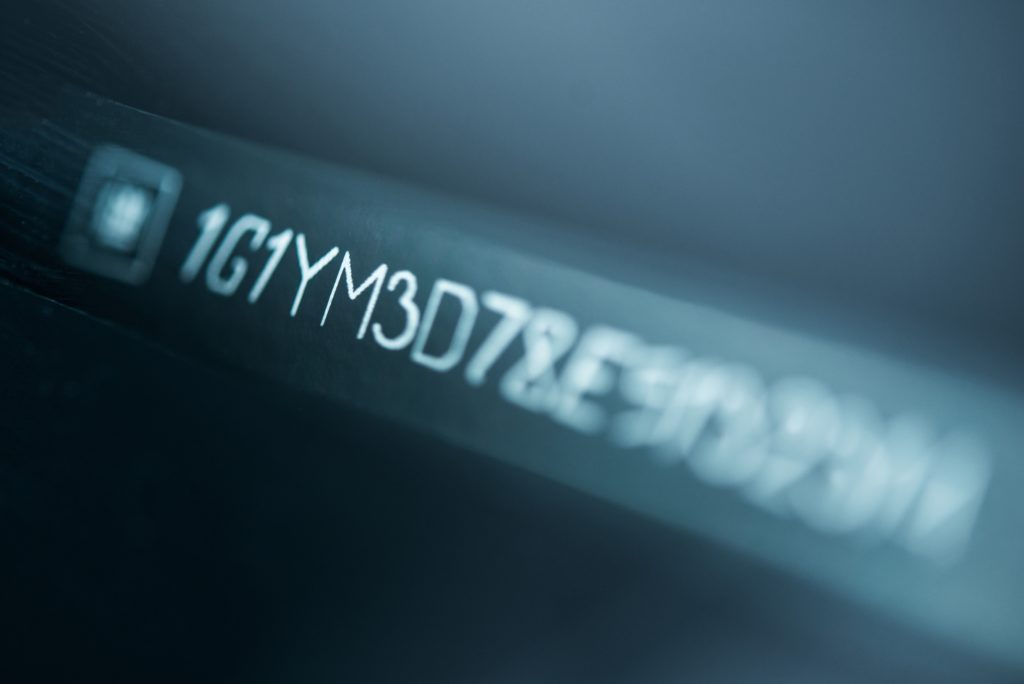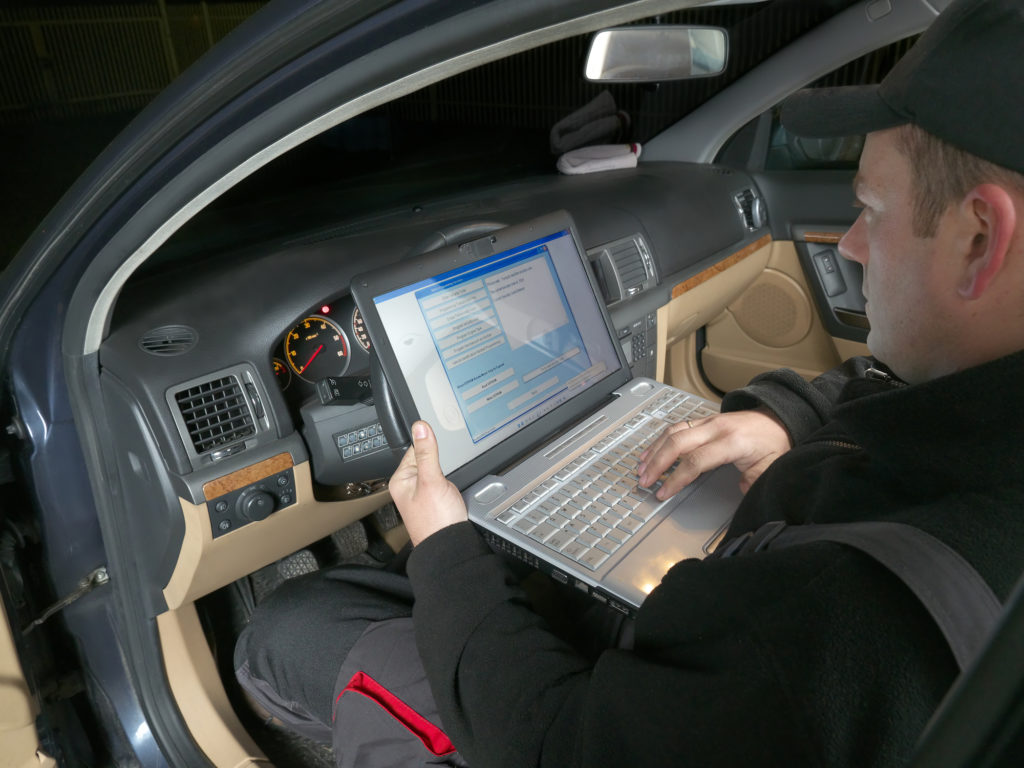Under a certain set of circumstances, there is no danger in giving out your car’s VIN. This can include if you’re selling a car to a potential buyer, either privately or to a dealership.
With that said, there are risks tied up in giving out your car’s VIN number, primarily the risk of VIN cloning and subsequent identity fraud. So let’s have a look at what your car’s VIN number actually does, the information it contains, and why it’s important when selling a car.

Contents
Should You Give Out VIN Number to a Prospective Car Buyer?
You are safe to give out your VIN to a specific potential buyer who has shown serious interest in purchasing your car.
Sharing the VIN with an interested potential buyer signals that you’re an honest person and are not trying to sell them a dud as it allows them to verify that it is not a stolen car and is a legitimate purchase.
However, if you’re placing an ad to sell your used car online, don’t put your VIN in the ad; the same applies if you’re trying to sell it on a forum.
What’s Contained in a VIN Number?
The ‘vehicle identification number’ is your car’s fingerprint. Composed of 17 characters, it contains many details about your car’s history, including where it was made, the model year, and its history.
It’s also connected to your license plate, insurance, registration, and owners. As a VIN contains all of this important information confirming your car’s legitimacy, it can be used for VIN cloning.
What can you do with the VIN?
You can use your VIN to legitimize a sale so the buyer can perform a VIN check. You can also perform your check if you wish simply to inspect your vehicle’s history.
The VIN can also be used to help law enforcement track your stolen vehicle in the event of a theft.
How to check the VIN
You can find your VIN in a few places in your car:
- The driver’s side dashboard.
- The drivers’ doorframe or pillar.
- Under the hood.
- The rear frame.
Once you have the VIN, you can use an online search service to search for the car’s history.
Performing a VIN check on a car you are hoping to buy will confirm the car’s history as well as its country of origin and age.
If you have any doubts about the vehicle you are purchasing, a VIN check is the way to put these fears to rest.
Are VIN Numbers Public Information?
No, a VIN number is not on public record in order to preserve the safety and security of the important information it carries.

Can You Get Personal Information From a VIN Number?
The VIN is linked to the owner of the car, but it is impossible to extract personal information from it. The VIN will contain information about the car, but details like your social security number and bank details are inaccessible from your VIN.
Any Reason Not to Give Out VIN?
Even though your VIN doesn’t contain sensitive personal information, it’s still important to be careful about its security.
VIN Cloning
This is the most apparent threat from oversharing your VIN.
VIN thieves can attach a cloned VIN to a stolen vehicle, effectively giving them a new identity. This allows criminals to sell on stolen cars as the identity of the car has been effectively changed, sharing an identity with someone else’s legitimately owned car.
This means the true owner of the VIN number may be blamed for offenses or damages committed by the owner of the cloned car.
A false tax return could be filed
This situation does not occur often but can cause long-running issues.
A VIN number can only be used once on a single tax return, so a false tax return could result in a long list of future difficulties with the IRS when your try to file your genuine tax return.
Your identity could be at risk
If your VIN is available in a public place, like online forums and vendor sites, the information it contains is at stake. Someone who wants to find out your age, address, and nationality can access this information easily by tracing your VIN.
Should a Buyer Ask a Car Seller for a VIN Number?
Absolutely. Potential buyers should acquire the VIN number of the car they wish to purchase to ensure they are purchasing a registered vehicle.
If a seller refuses to give you the VIN, this is a red flag and may confirm they are not a trustworthy business partner.
Why Do Car Dealerships Ask for a VIN Number?
A dealership will ask for your VIN so they are ensured they are making a legitimate deal and so they can share it with a prospective buyer.
They can ask questions about the performance of the vehicle, repairs you have made to it, and anything else they should be made aware of that they can cross-check with the VIN.
How to Ask Car Sellers for a VIN Number
If you are interested in buying a car, the exchange of the car’s VIN number is part of the selling process and is a request any vendor should be happy to oblige you.
Car dealerships will be happy to share the VIN with you if you wish to buy a car.
So, What If the Seller Won’t Give the VIN Number?
This should set alarm bells off immediately. Anyone genuinely looking to sell their car will have no reason to conceal their VIN and should be happy to do so in order to expedite an agreeable sale.
If the person selling the vehicle isn’t forthcoming with the VIN, besides them being potentially anxious about you not being a trustworthy prospective buyer, chances are they are not trustworthy themselves.
They may be attempting to conceal parts of the history of the car from you, or they are in possession of a vehicle with a cloned VIN.
VIN Number FAQs
What can a scammer do with a VIN number?
Your VIN is not top-secret information; it’s readily available on the windshield of your car. If a scammer wants to, they can access your VIN and use it to apply for duplicate papers that they can use to reconstruct the identity of a vehicle.
Why do banks need VINs?
If you are looking to take out a new car loan, a bank will require a host of information from you in order to establish your trustworthiness as a borrower.
A bank will ask you to produce your VIN so they can check its history and establish your ability as a driver and car owner. After this, they can apply an appropriate risk level to the loan as well as the interest rate.
Is it safe to give out VIN number on craigslist?
Certainly not. Posting your VIN on an unregulated and easily accessed forum is a shortcut to having it co-opted by scammers.
Rest assured, scammers will rely on websites like Craigslist, where less informed car owners will post their VIN without considering the repercussions.
Is VIN check safe?
Yes, there is no danger in using a legitimate VIN check website to run a background check on a VIN.
If you are feeling anxious about the site you use to check a VIN, then feel free to run your own background checks to ensure the website is legitimate.














